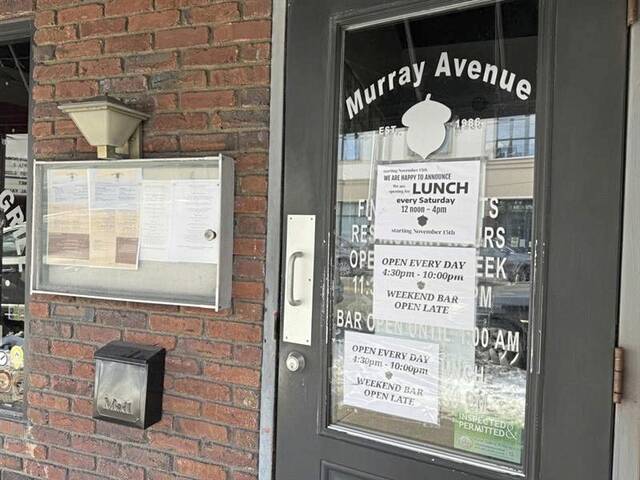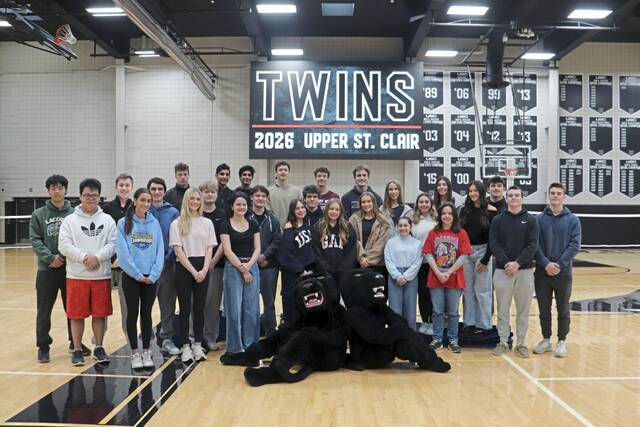Michelle Walker placed her left palm underneath her right hand, forming a thumbs-up with her right hand. The palm of her left hand moved the right hand upward. This sign is part of American Sign Language and is a lifesaving contact sign that means “help.”
She demonstrated emergency signs to a room full of City of Pittsburgh employees inside the mayor’s office on July 23.
Walker is the ADA and disability resources coordinator for the City of Pittsburgh and has been teaching ASL since 2006. Her goal is to bring more awareness around deaf culture and the importance of ASL to eliminate bias and myths surrounding deafness.
She said English and ASL are two completely different languages. When communicating and signing, expression and empathy are crucial to conveying emotions while leaving assumptions behind. Walker, who was born deaf, said she sees the word “disability” as an asset rather than a liability (her interview with TribLive was conducted vocally).
July is Disability Pride Month.
“There are things that I can do that someone with full hearing may not be able to do. I lip read, and my senses of smell, taste and touch are heightened,” Walker said.
She emphasized that different people may rely on different methods of communication, such as lip reading, captions, ASL interpreters, hearing aids, cochlear implants, or a mix of these modalities, so empathy is important.
She lives by a quote from Charles Blow: “One doesn’t have to operate with great malice to do great harm. The absence of empathy and understanding are sufficient.”
“I am so proud of Michelle,” Pittsburgh Mayor Ed Gainey said. “It’s important to include and get full insight from the voices of those impacted by the policies being created. It is important for us all to learn about what people in the disabled community need,” he said.
Walker is grateful for how the city is championing the disabled community and their rights.
“We want a leveled playing field. We want the same as everyone else: the opportunity to live the best life we can, inclusive of our disabilities,” Walker said.
During the lesson, Walker pointed both her index fingers toward each other, then began twisting clockwise, then counterclockwise, and moving them closer together. This means, “Are you hurt or in pain?” She moves her eyebrows up and down as she asks the question. An important component of signing is facial expression and flexible hands.
She places two fingers on her shoulder and then moves them down her arm, the sign to ask if someone needs to go to the hospital. Being understood is important, Walker said. Without having access to language to get something across, in essence, a person is trapped in their body, she said. Walker plans to give ASL training to each department of the city.
Walker remembered an occasion in 2020 at the grocery store: while in the checkout line, she asked the cashier where the syrup was. It took three tries due to the masks and the cashier’s soft-spokenness. Though she ended up getting the syrup, her exasperation was high and she said she cried outside of the grocery store.
Walker does not want others to experience that.
She is leading the mission to create a new ADA Transition Plan in Pittsburgh. The initiative includes a two-phase project over two years. The first part involves a self-evaluation, going through the city’s programs and facilities and the right-of-way, which includes sidewalks, streets, public paths and crosswalks finding where the barriers are. The second part will take the data and convert it into a plan with ways to resolve the barriers. This is the first update in more than three decades — the first one was done in 1992.
Audrey Wells, digital communications specialist for the city, was at the ASL lesson led by Walker.
“It is really important that we provide accommodations for people from all lived experiences and walks of life,” Wells said. She enjoyed learning from someone who is part of the community to gain an understanding that may not have been there before.
Walker grew up in Beltzhoover and Knoxville and said there was no special treatment and she had to develop thick skin.
“My parents did not want me to feel pity, and I appreciate that now,” she said. Pity is the last thing that people with disabilities want others to feel for them, she added — championing and uplifting are much better.
Walker’s mother worked as a nurse and her father worked as a maintenance worker.
“Having my parents work with people who have disabilities and the empathy they showed me, I feel makes me more aware and more understanding,” Walker said.
But there were still moments she felt misunderstood.
Walker was born premature and her ears were not fully developed. After getting hit by a truck at 14 and being seriously injured, she had to use a wheelchair, cane and walker, which increased her awareness and relatability to the disabled community.
She teaches her son, who is hearing and 4 years old, ASL.
“He responds with more emotion from my ASL ‘no,’ where I take my first two fingers and tap them against my thumb while also shaking my head ‘no,’ than my vocal ‘no.’ He doesn’t like when the ASL ‘no’ comes out,” she said.
When Walker wears her hair down, her disability becomes invisible, she said. Her hair covers the hearing aid, and many times people make assumptions. For hearing persons, the best way to support the disability community is to “be aware, show empathy, and find out which method of communication is best for that individual. We are not a monolith. No pity, we want excitement,” Walker said.
She implores people to be understanding. She sees a bright future for accessibility, which she can see in action in Pittsburgh.
“You couldn’t have told me as a child in a special education class that I’d be here, working in the mayor’s office. This is just the beginning,” she said.








